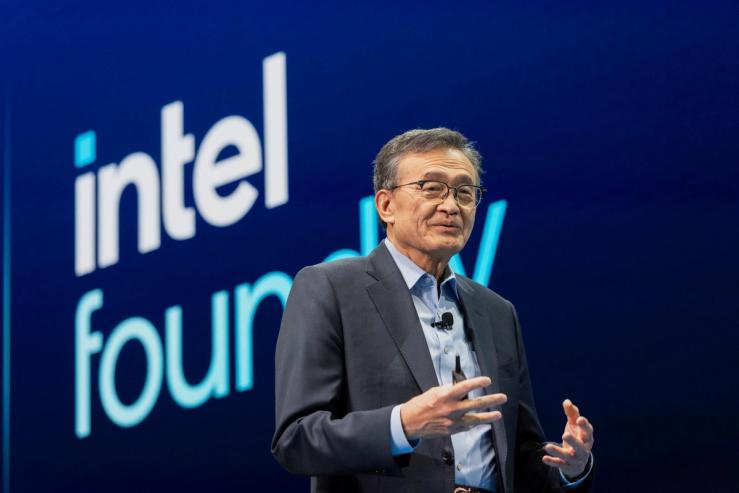The Scoop
When Intel CEO Lip-Bu Tan’s back was against the wall, some of America’s most powerful chief executives stepped up to vouch for him.
Microsoft’s Satya Nadella, Nvidia’s Jensen Huang, and tech founder Michael Dell were among the executives who reached out to President Donald Trump or his top aides to talk up Tan’s credentials and patriotism after the president publicly called for him to be fired, according to people familiar with the matter. The conversations, which came ahead of Tan’s Aug. 11 meeting with Trump at the White House, appear to have helped soften the criticisms and win Tan a presidential seal of approval.
Trump, who had called Tan “highly conflicted” because of his previous investments in Chinese tech companies with military ties, subsequently praised his “amazing story.” The government soon announced it was taking a 10% stake in Intel, which catalyzed a series of private-sector investments, including from Nvidia.
Microsoft declined to comment on “any private communications.” A spokesperson for Intel declined to comment. Spokespeople for Dell and Nvidia did not return multiple requests for comment.
“President Trump and the Administration are in regular contact with business leaders,” White House spokesman Kush Desai said. “The only factor guiding President Trump’s decision-making, however, is the best interest of the American people.”
In this article:
Liz’s view
This successful but discreet persuasion campaign offers a rare glimpse into how corporate America can still bend Trump’s ear. Trump’s policy positions are notoriously elastic (see: “TACO trade theory”), but his personal vendettas — think Fed Gov. Lisa Cook or James Comey — tend to be one-way ratchets. Yet a crew of Silicon Valley heavyweights managed to engineer a presidential walk-back — directly, not just through strategic appearances on Maria Bartiromo.
It suggests a barely-perceptible-but-there return to the first Trump administration, which executives appreciated for its commercial approach to governing and its generally open door. (They got neither from Joe Biden.) That let’s-make-a-deal vibe — which plenty of executives learned to navigate, and even appreciate — has given way to something heavier-handed in Trump’s second term, more mercantile than commercial.
Corporate America has been left playing defense when it’s bothered to suit up at all. Even those who like parts of his agenda have been stumped about how to talk him out of the stuff that terrifies them — whiplash tariffs and a labor-depleting immigration crackdown. First-term Trump was malleable because he wanted their validation. Second-term Trump is less so because he wants their obedience.
The calls Silicon Valley giants made on Tan’s behalf might well have ended with a Trump Truth zinger accusing them all of running air cover for a Chinese sleeper agent. Instead, they appear to have aided a climbdown that, a few weeks on, looks genuinely good for America’s AI ambitions: Intel’s strange but stabilizing government support has been followed by private-sector votes of confidence.
There are other hints that the back-channel influence that made Trump 1.0 CEO-friendly is sputtering back to life. Blackstone CEO Steve Schwarzman’s been playing fixer between Harvard and the White House, per The New York Times. It’s not risk-free — he’s going up against hardliners who think the Harvard deal is too generous. Tech CEOs lobbying Trump similarly risk the wrath of true believers in the administration who, quite simply, hate them.
But that Schwarzman, Nadella, Dell, and others can enter the arena and come out not only unscathed but with a bit of what they came for suggests something important: There’s still some of that old Trump pragmatism in there, along with the baseline GOP reflex to be nice to big business. CEOs stuck in a defensive crouch just got a reminder that offense works.
Room for Disagreement
This may be a one-off in an area — AI and the need for the US to win — that’s less clouded by the ideology that drives the president. The White House and the business community are more aligned around industrial policy than on cultural wedges like perceived anti-conservative bias, as Bank of America CEO Brian Moynihan learned the hard way in public.
Notable
- Sometimes the lobbying happens in the open: more than a dozen technology executives, including Microsoft founder Bill Gates, had dinner at the White House in September to press their cases on how the government can help foster AI development.
- And sometimes it pays off big time: Chevron’s Mike Wirth privately pushed the administration to let the oil major resume operations in Venezuela. Months later, Chevron got its wish.

